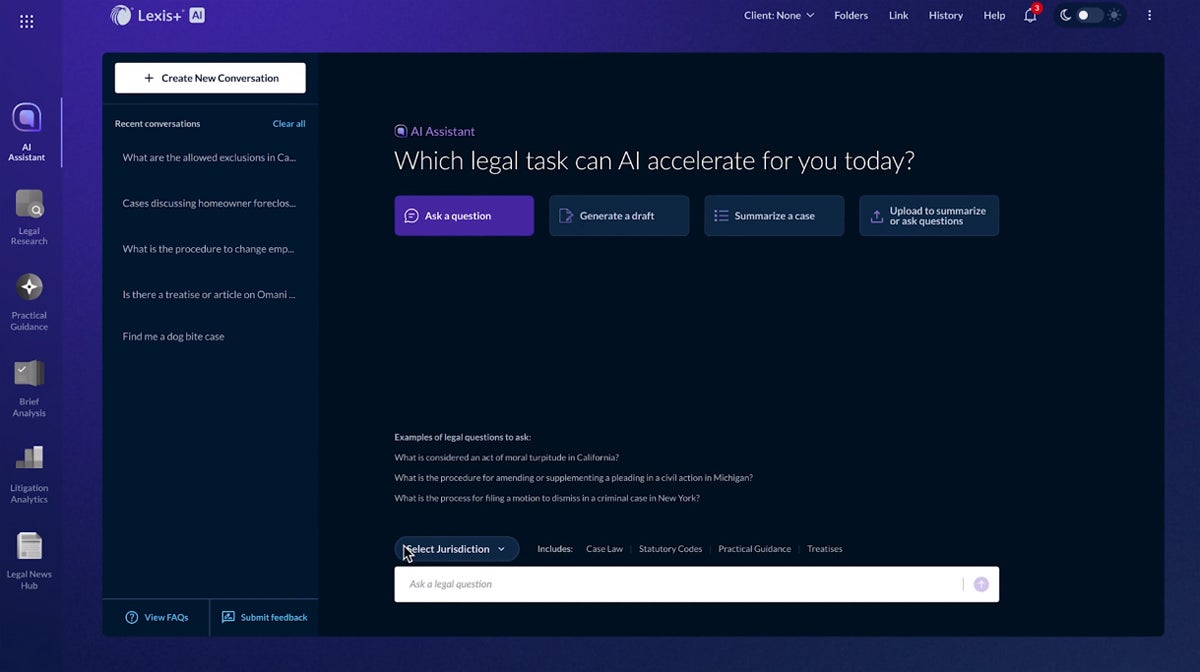Australia's private practice legal market is diving headlong into providing AI-assisted legal services. Leading brands such as Clayton Utz, Minter Ellison and Holding Redlich are signaling their first steps in using AI and their desire to grow through 2024 and beyond.
Law firms are testing AI for tasks including legal research and drafting legal documents, supported by custom AI models trained on legal data. AI could speed up the delivery of legal services, improve the costs of legal services, and redirect lawyers to more complex matters.
Examples of the Australian legal profession embracing AI
Australia has a mature and highly innovative private practice legal market. It has been among the first legal markets in the world to see the potential of generative AI to accelerate and increase the delivery of legal services to public and private sector clients.
SEE: Here are some IT challenges Australia needs to address to seize the AI moment.
Although legal information services firms such as LexisNexis and Thomson Reuters have been rolling out AI services to the US market first, Australian law firms were quick to test them as they became available. They are also developing internal AI models and approaches.
Clayton Utz
Clayton Utz is among the first law firms in Australia to trial Lexis+ AI, a new legal generative AI tool from LexisNexis, for generating drafts of legal documents and other communications. This follows other initiatives by the firm, including the use of Lexis+, an argument analyzer, which can analyze legal documents and suggest improvements to a lawyer's litigation strategy.
MinterEllison
MinterEllison was one of only two Australian law firms that Microsoft invited to participate in its Copilot for the Microsoft 365 Early Access Program. The company is also building its own generative AI tools, including Chat with ME, a custom internal research LLM using OpenAI's GPT-4 in the company's private, secure Microsoft Azure environment, among other internal initiatives.
Stay honest
Holding Redlich is another Australian company that is testing the Drafting legal documents and emails with Lexis+ AI.. Using the tool similarly to Clayton Utz, Holding Redlich attorneys can ask Lexis+ AI to create first drafts of documents, including client advice, as well as other common items such as internal emails or court filings, such as statements of claim. .

Maddocks
Maddocks is the first Australian law firm in Australia to adopt AI paralegal CoCounsel Coredeveloped by Thomson Reuters, which is in a proof-of-concept phase and has been deployed at more than 45 law firms in the U.S. Lawyers have been identifying use cases and experimenting, according to CEO David Newman, who said it could “modernize the way we work.”
Lander and Rogers
Lander & Rogers, like MinterEllison, has adopted Microsoft Copilot to help lawyers with tasks including contract drafting and review, legal research, legal reasoning, data extraction and analysis, and more generic use cases such as emails and briefings. of meetings. The company plans to adopt Copilot company-wide after testing and has also launched a dedicated AI lab.
What are the key use cases for AI in the legal profession?
There are many potential use cases for AI in law firms. Examples named by Microsoft They include legal writing, legal research and analysis, due diligence, summaries and communications.
PREMIUM: Explore these other top AI use cases.
Legal research and content generation are two key general use cases for the legal profession.
Legal investigation
Private practice law firms provide expert legal and business advice based on published global and local laws and regulations, as well as case law and precedents. They offer interpretations and opinions to help clients make informed and compliant legal decisions.
The AI receives this documented information, which could greatly reduce investigation time. For example, Lexis+ AI, built on Anthropic's Claude 2 and OpenAI's GPT-4, has been trained on LexisNexis' database of 1.23 million judicial opinions, statutes, filings, and secondary materials.
A large language model trained on an extensive legal database is capable of providing draft legal advice based on high-quality real-world legal material. You can also provide precise quotes that support the result obtained. Lawyers can then analyze and adjust the results to deliver to a client.
Content generation
Legal research, which had been possible with some previous AI tools, has now been extended with generative AI to enable the generation of natural language and legal texts. For law firms, this means the ability to generate everything from complete drafts of legal documents to client emails.
Lawyers will also be able to engage in conversations with the generated text results. Through rapid engineering through conversational interfaces, they will be able to adjust the results generated to optimize their advice before delivering it to end users, such as clients or courts.
Can AI legal models produce accurate legal writing and advice?
The main legal models of generative AI are far removed from the efforts of some Lawyers who have been caught using crazy ChatGPT cases. in court filings in the US and Canada. Models are trained on a wealth of legal data, and techniques such as fine-tuning, recovery-augmented generation, and rapid engineering help create accurate responses:
- Fine tuning: LexisNexis explains that its Lexis+ AI tool is a retrained version of ready-to-use LLM. Large amounts of relevant legal data improve your ability to perform legal tasks.
- RAG: The accuracy of the results is compared to a trusted source of knowledge through RAG. Lexis+ AI, for example, references high-quality legal content to inform truthful responses.
- Quick engineering: Good quick engineering can significantly reduce the risk of hallucinations in legal use cases, and trained lawyers are likely to be good at this discipline due to their verbal reasoning skills.
How could AI adoption change Australia's legal market?
Australia's legal market is highly competitive. Several large, midsize and boutique law firms compete for client relationships and new business in a variety of lucrative practice areas, including corporate, mergers and acquisitions, media, telecommunications and litigation. The implementation of AI has the potential to change legal services in several ways.
Legal advice could be delivered to clients faster
The timeliness of legal advice is essential to support clients. The integration of AI could greatly accelerate lawyers' ability to research and analyze legislation and case law and provide considered legal advice. Some local businesses have witnessed hours reduced on some tasks.
SEE: Australia's legal sector could learn from CBA's 'experiments' with AI in banking.
“The ability to generate content, including client correspondence, contract terms, pleadings, legal advice memoranda and other documentation, represents an incredible opportunity for the legal profession to safely and responsibly expedite routine legal work,” according to the Microsoft report.
AI could reduce the costs of external legal advice
Law firms will increasingly be able to offer accurate and relevant legal advice at a lower price. The potential reduction in billable hours required by attorneys at the associate, senior associate and partner levels could result in a price war at law firms and pressure on legal fees.
Law firms whose partners in the Sydney market He can earn 1.5 million dollars a year., they will be interested in retaining the value of commissions paid despite productivity improvements. They are likely to further shift billing toward value-based pricing rather than billing by the number of hours worked.
AI could become a battlefront in the war for legal talent
Australian law firms compete strongly for legal talent. Firms want to hire and retain the best lawyers and make them partners. Law firms that do not adopt AI tools risk losing lawyers to those who do because they may see this as the future of legal practice.
AI could be an existential threat for some lawyers
Lawyers work in a knowledge industry and are considered to have high exposure to generative AI. A report published by Goldman Sachs in early 2023 analyzed the US market and found that up to 44% of the tasks performed by lawyers Today it could one day be automated with artificial intelligence tools.
Australian law firm Holding Redlich previously participated in a Turing test exercise that confirmed that LexisNexis' 'argument analyzer' tool, Lexis+, could surpass a human being in strengthening the submission of a lawyer suggesting relevant case law to reference in it.
AI law firms will employ super lawyers, capable of performing many of the knowledge tasks that consume lawyers' time. Lawyers can become more involved in requesting and reviewing AI results, advising on more complex or emerging matters, and building relationships with clients.









